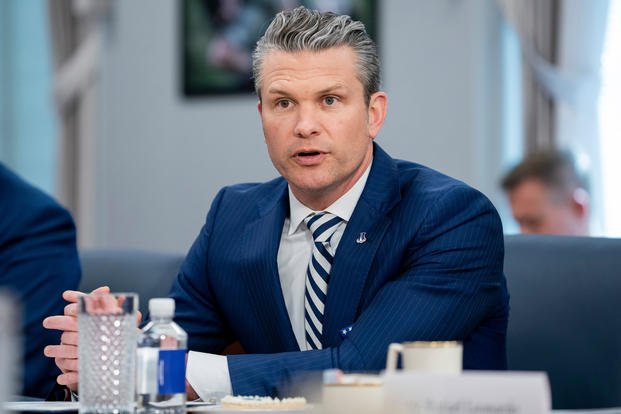Joint Chiefs Chairman Caine Decides Not to Keep Senior Enlisted Adviser, Breaking with Past Precedent

The military's top enlisted adviser -- a senior adviser to the Joint Chiefs chairman -- will be stepping down in the months to come, Pentagon officials told Military.com on Monday.
Marine Corps[1] Sgt. Maj. Troy Black will depart the post and retire from military service after the newly confirmed Joint Chiefs chairman, Air Force[2] Gen. Dan Caine, chose not to renew Black's posting for another two-year stretch, one official said.
However, that defense official stressed that, while Black would not be serving in the senior enlisted adviser to the chairman, or SEAC, role for as long as his predecessors, the move was not a firing and that Caine "has the greatest respect and admiration for SEAC Black."
Read Next: Marine Corps Unveils New List of Bonuses Aimed at Keeping Crucial Jobs Filled[3]
Caine's decision not to give Black another term appears to be one of his first major moves in the Joint Chiefs chairman role since he was confirmed and took over earlier this month. President Donald Trump handpicked Caine, despite his retirement from the military and not meeting the qualifications[4] for the job.
Black came to the role in the summer of 2023 after serving as the Marine Corps' top enlisted service member, Sergeant Major of the Marine Corps. Then-chairman of the Joint Chiefs of Staff Army[5] Gen. Mark Milley named Black to the position[6] that serves as the chairman's "direct tie to the enlisted force."
Black, then a 35-year Marine veteran, relieved Air Force Chief Master Sgt. Ramón "CZ" Colón-López, who had served in the SEAC job for four years.
The official said that, while Black's predecessors like Colón-López served four-year terms, the SEAC job is actually a two-year post with an option to be extended two more years -- an option that Caine will not be exercising.
The official who spoke with Military.com did so on the condition of anonymity to be able to discuss personnel matters more candidly.
Despite their assurances that the move was not a firing, the two-year term appeared to be unanticipated on Black's part. On his official website, Black outlined[7] a "four-year plan" that includes transitioning to his successor in year four.
Black is only the fifth person to hold the job since the position was created in 2005. Three of his predecessors served for four years, while the first SEAC served for only three.
From 2008 to 2011, while Adm. Mike Mullen was Joint Chiefs chairman, the post went unfilled.
Overall, the posting is relatively obscure, and the service members who have held the job have been relatively unknown compared to their service-level counterparts who have taken on leading roles in shaping service-level policy[8] that directly affects troops, helping raise awareness and funds[9], or serving as an example of what women can achieve[10] in the service.
Black focused some of his efforts on boosting fitness in the military as well as how military leaders manage their enlisted force -- a goal that he had as the Marine Corps' top enlisted adviser as well.
"A holistic human performance system is being developed right now in order to make sure that we talk about our mental, physical, behavioral, spiritual and emotional or social fitness," Black told troops[11] at Joint Base Andrews[12], Maryland, in February.
"We focus on the physical as the end state, but the fact of the matter is we are machines encased as humans; we don't just do one thing," he said.
Black's background as a machine gunner and his battlefield accomplishments drew attention early in his tenure[13] as the Sergeant Major of the Marine Corps, but he would go on to speak regularly[14] about improving quality of life for average Marines.
Black used his time in that job to speak to the press and Congress[15] about policy changes or improvements that were being made[16] with an eye toward making service in the Corps less challenging. Black often referenced his wife, a retired first sergeant, as a source of inside knowledge on the challenges that come with a military lifestyle.
The official who spoke with Military.com said he expected Black to retire from the military in the summer or early fall.
-- Steve Beynon contributed to this report.
Related: Marine Tapped to Be Top Enlisted Adviser to the Joint Chiefs of Staff[17]
© Copyright 2025 Military.com. All rights reserved. This article may not be republished, rebroadcast, rewritten or otherwise distributed without written permission. To reprint or license this article or any content from Military.com, please submit your request here[18].
